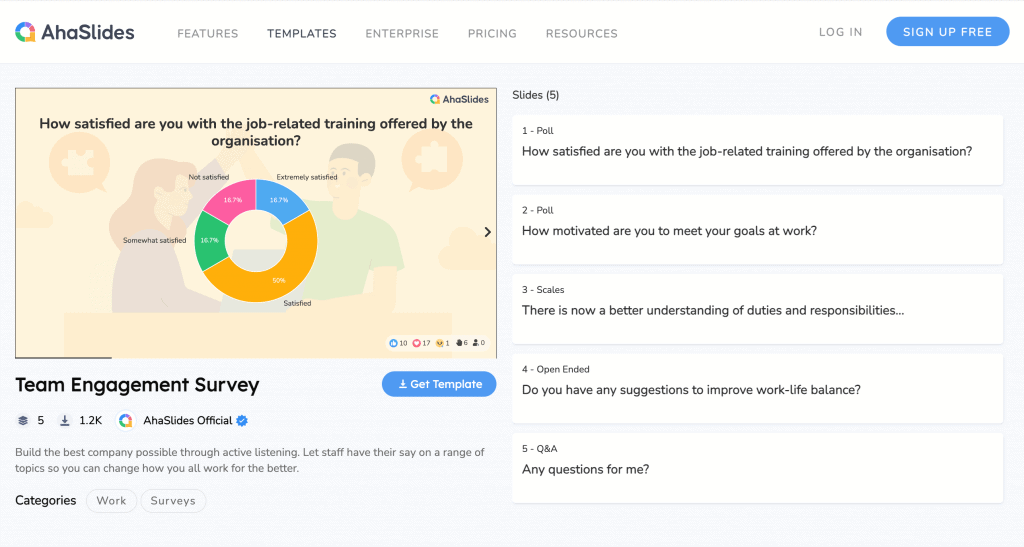In today's highly competitive business world, companies prioritising employee engagement have a clear advantage. Engaged employees are more productive and dedicated and contribute to a positive work culture, attract top talent, and raise overall morale. Let's dive in and discover what it is, the importance of employee engagement, and how you can increase it in your organization.
| What are the 4 pillars of employee engagement? | Effective communication, Learning and development, Healthy work-life balance, and Rewarding employees' efforts. |
| What are the 5 C's of employee engagement? | The 5 C’s strategy in employee engagement includes Care, Connect, Coach, Contribute, and Congratulate. |
Table of Contents
- #1 - What Is Employee Engagement?
- #2 - The Importance Of Employee Engagement
- #3 - How To Increase Employee Engagement
- Key Takeaways
- Frequently Asked Question

Finding a way to stop your staffs from leaving?
Improve retention rate, get your team to talk to each other better with fun quiz on AhaSlides. Sign up to take free quiz from AhaSlides template library!
🚀 Grab Free Quiz☁️
#1 - What Is Employee Engagement?
So, what is employee engagement, and why is it important?
Employee engagement refers to the emotional commitment and dedication that an employee has to their job, their team, and their organization as a whole.
Engaged employees are passionate about their work, motivated to perform at their best, and loyal to their employer through thick and thin.

However, employee engagement involves employers creating a positive work environment where employees feel supported, valued, and empowered to contribute to the organization. When employees are engaged, they are more productive, creative, and dedicated to achieving the company's goals.
Like superheroes, when employees are engaged, they're ready to use their powers to achieve company goals and save the day.
#2 - The Importance Of Employee Engagement
Employee engagement is incredibly important for the success and sustainability of any organization. Here are some reasons why:
1/ Reduce Reason For Leaving Job
It's true. Employee engagement can help you keep your employees from walking out the door faster with a reason for leaving job than you can say "raise".
When employees feel engaged, valued, and supported in their work, they are less likely to leave their jobs for reasons such as feeling unappreciated, underpaid, or experiencing a lack of opportunities for growth and development.
Plus, when your company invests in employee engagement programs, you're showing your employees that you care about them and their well-being. That kind of investment can pay off big time in terms of employee retention and attracting top talent.
2/ Increase Employee Dedication To Work
When employees are engaged in their work, it's like they're on fire - they're dedicated to work, passionate, and all-in!
They don't just see their job as a paycheck; they see it as a way to contribute to the company's success and make a meaningful impact, resulting in higher productivity, better quality work, and a more positive workplace culture.
So who wouldn't want that kind of employee on their team?

3/ Healthier Employee Work-life Balance
When employees feel engaged in their work, they feel fulfilled and purposeful in what they do. It can lead to a healthier work-life balance.
More specifically, engaged employees also can control their work and their time. They feel empowered to take breaks, manage their workload, and prioritize tasks in a way that works for them.
Additionally, companies prioritising employee engagement can offer programs and benefits supporting work-life balance, such as flexible schedules, remote working options, and more paid time off. These benefits can help employees feel valued and supported, leading to a better overall work-life balance.
4/ Eliminate Toxic Work Environment
Employee engagement can play a crucial role in eliminating toxic work environments.
A toxic work environment can arise from various factors, such as poor communication, lack of trust, poor leadership, and a culture of negativity. These factors can lead to disengaged and unhappy employees, creating a cycle of toxicity.
However, employee engagement initiatives can help eliminate these factors and create a positive work environment. When employees feel connected to their work and valued, supported, and respected, they can increase their motivation, productivity, and job satisfaction.
5/ Support Urgent Leave Cases
Employee engagement can support urgent leave cases, including finding good excuses to miss work.
Employees who feel engaged and connected to their work will take their responsibilities seriously and prioritize their tasks. They are less likely to miss work without a valid reason or with a poor excuse.
In addition, employee engagement can also help to create a culture of transparency and open communication between employees and their managers. It helps employees feel comfortable discussing any urgent leave needs with their managers and working together to find a solution that works for both parties.

#3 - How To Increase Employee Engagement
To increase employee engagement in the workplace, you need some methods as follows:
1/ Employee Engagement Surveys
Conducting an employee engagement survey is the first step you should take to measure how engaged your employees are.
These surveys help employers collect employees' feedback about their level of engagement, job satisfaction, and overall experience working for the company.
The surveys can be customized to suit the company's needs and its employees, asking questions about communication, leadership, recognition, work-life balance, opportunities for growth and development, etc.
Based on the data received from these surveys, employers can take action to address any concerns or areas for improvement.
- For example, if employees express dissatisfaction with communication or leadership, employers can work on improving these areas through regular check-ins, open communication channels, and training for managers.
2/ Employee Engagement Activities
With employee engagement activities, companies can create a positive and supportive workplace culture that fosters engagement, motivation, and productivity. Here are some activities to boost engagement you should consider:
- Team-building activities: Team-building activities to help build relationships and improve communication between employees. This can include activities such as group outings, team-building exercises, and social events.
- Recognition programs: Implement recognition programs that acknowledge and reward employees for their hard work and achievements, such as employee of the month awards, bonuses, and other incentives.
- Learning and development opportunities: You can provide opportunities for employees to learn and grow through training programs, mentorship opportunities, and tuition reimbursement for further education.
- Employee wellness programs: You can offer programs that promote physical and mental wellness, such as gym memberships, yoga classes, and meditation sessions.
Read more: Top 20+ Creative Employee Engagement Activities Which Works

3/ Employee Engagement Programs
By implementing employee engagement programs, companies can create a more engaged, motivated, and dedicated workforce.
These programs not only benefit employees but also contribute to the organization, including increasing productivity, reducing turnover rates, and attracting top talent.
Here are some programs to do so:
- Recognition and Rewards Programs: These programs can include bonuses, promotions, and public recognition.
- Professional Development Opportunities: Offer professional development opportunities such as training programs, conferences, and certifications.
- Employee Feedback: Provide employees with opportunities to give feedback and participate in decision-making processes.
- Social Activities: Organize social activities such as team-building events, office parties, and volunteer opportunities.
- ...
Read more: Top 15 Employee Engagement Programs for any HR-er
4/ Employee Motivation Strategies
Employee motivation strategies can help companies create a culture of engagement that leads to higher productivity, better employee retention rates, and overall business success.
Motivation strategies can include a range of techniques, such as offering incentives and rewards, providing opportunities for career growth and development, creating a positive work environment, and recognizing employees' achievements and contributions.
- For example, offering flexible work arrangements or allowing employees to work remotely can help boost motivation and engagement by giving them a sense of autonomy and work-life balance.
So, there are some employee motivation strategies that you might need:
- Professional Development
- Flexible Work Options
- Recognition and Rewards
- Clear Communication
5/ Empower Employees
Empowering employees is a critical component of increasing employee engagement. When employees feel like they have a say in their work and are trusted to make decisions, they are more likely to feel motivated and engaged.
However, empowering employees is a process that takes time and effort. It requires a shift in the company's culture and management style, which can be challenging and long-term. Companies must be committed to creating a work environment that values employee input and provides opportunities for growth and development.
Additionally, it requires consistent communication and support from management to ensure that employees feel comfortable and confident in their decision-making abilities.
Therefore, if you don't know how to start, you might need a step-by-step guide to empower employees

Key Takeaways
Employee engagement is crucial for business success as engaged employees are more productive, innovative, and committed to their work, which can lead to better business outcomes.
In addition, the importance of employee engagement is undeniable.
However, engaging employees requires a significant amount of effort and the right approaches, which you might need to:
- Conduct an employee engagement survey
- Implement employee engagement activities
- Offer employee engagement programs
- Apply employee motivation strategies
- Learn how to empower employees

And don't forget with features such as live polling, Q&A, quizzes, and word clouds, AhaSlides can be used by companies to engage your employees during meetings, training sessions, or team-building activities.
By using AhaSlides, employees can actively participate and provide feedback!
Source: EngagetoSuccess
Frequently Asked Questions
What is employee engagement?
Employee engagement refers to employees' emotional and commitment bonds towards their work and their organization. Engaged employees feel connected to their work, their colleagues, and the overall mission and values of the company. It is important because engaged employees are more productive, creative, and dedicated to achieving the company's goals.
What is an example of engagement with employees?
An example of engagement with employees in action could be a company hosting a team-building event that encourages collaboration and communication among employees such as a day-long offsite retreat, a fun competition or challenge, or even just a social gathering outside work hours. By providing opportunities for employees to connect and engage with each other outside of their daily work tasks, companies can help build stronger relationships among team members. It leads to a higher engagement level in the workplace.
What is a good employee engagement strategy?
Good employee engagement is when employees are fully committed and involved in their work, feel meaning in their role, and are motivated to contribute to the organization's success. For example, a company that regularly communicates with its employees listens to their feedback and provides opportunities for growth and development. The company could also have a culture of recognition and reward, where employees are acknowledged and appreciated for their hard work and contributions.







